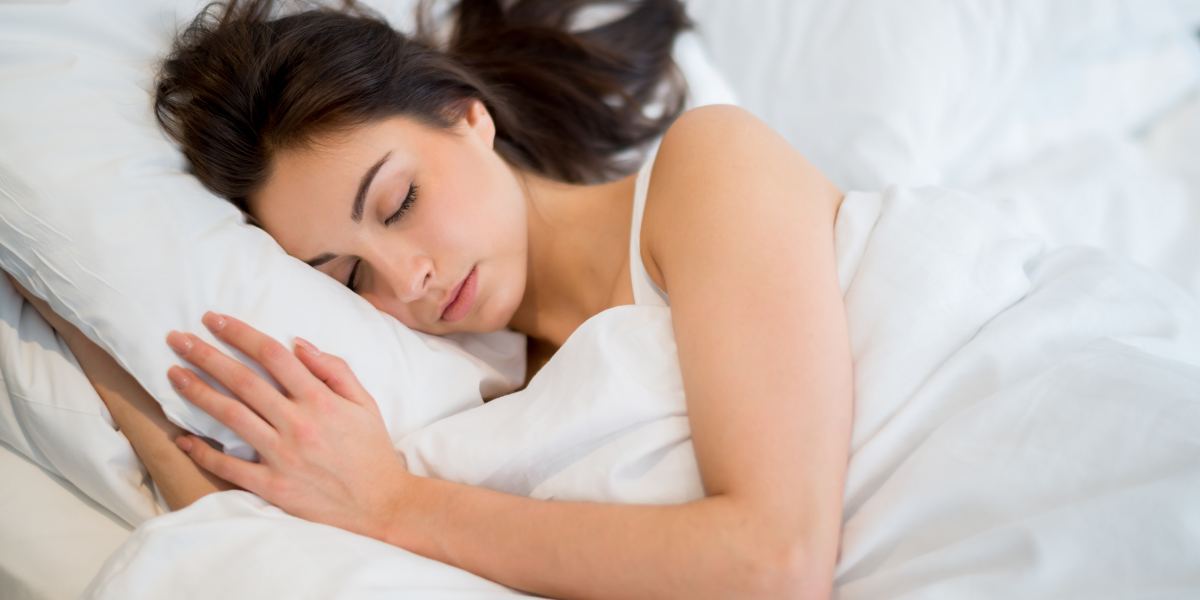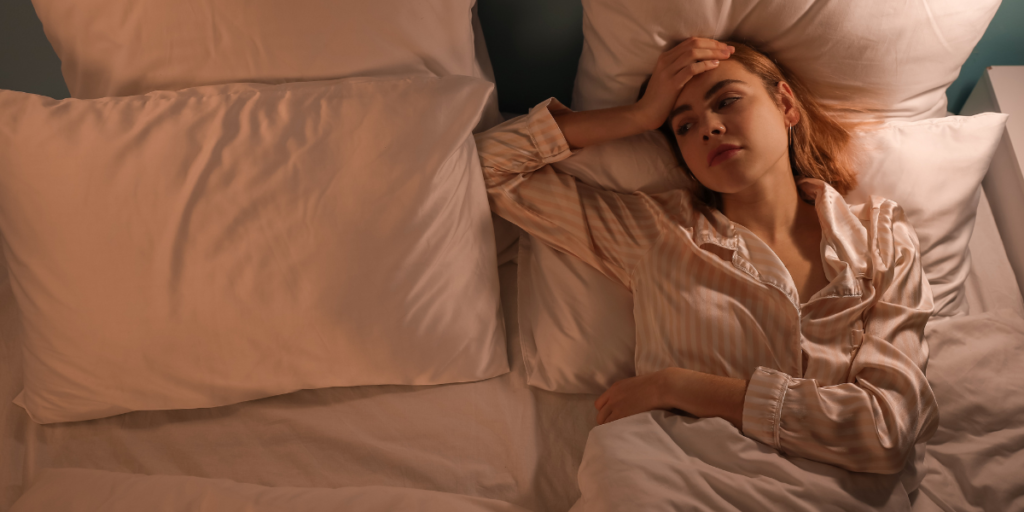Key Takeaways:
- Women’s Unique Sleep Needs: Understand how biology and lifestyle contribute to why women may need more sleep than men.
- Overcoming Sleep Challenges: Learn about common sleep issues women face and practical strategies to address them.
- Tailored Sleep Solution: Discover how to identify your ideal sleep schedule and create a personalized routine for better rest.
Waking up tired after a full night’s sleep can feel like an endless cycle, especially for women who juggle multiple roles every day. At Reposé, we know that women’s sleep needs are influenced by unique factors like hormonal changes, stress, and biological rhythms. That’s why we’re passionate about providing thoughtful solutions—from our soothing Self-Heating Eye Masks to vegan Melatonin Gummies—to make relaxation simple and effective.
This article looks deeper into why women’s sleep needs differ and offers practical, science-backed ways to improve your rest. Let’s get started!
Do Women Really Need More Sleep Than Men?
The notion that women require more sleep than men isn’t a baseless stereotype—it’s a concept rooted in scientific evidence. Studies reveal that women’s brains often engage in more intensive cognitive and emotional processing throughout the day, which may increase their need for restorative rest. Hormonal changes and individual differences further highlight why sleep requirements vary between genders. Below, we delve into the key factors behind this phenomenon.
The Cognitive Load: Why Women’s Brains Work Harder
Research indicates that women are more likely to engage in multitasking and emotional regulation, which can place significant demands on the brain. This heightened mental activity requires additional recovery during sleep to maintain cognitive function and mental clarity.
Hormonal Fluctuations And Their Impact On Sleep
Hormonal changes, such as those during menstrual cycles, pregnancy, and menopause, directly affect women’s sleep quality. These fluctuations can disrupt the circadian rhythm, leading to increased fatigue and a greater need for restorative rest.
Individual Differences In Sleep Needs
While science suggests women may need an average of 20 more minutes of sleep than men, sleep needs are deeply personal. Factors such as age, health, lifestyle, and genetic predispositions play a larger role in determining how much sleep an individual requires to feel rested.
The Importance Of Listening To Your Body
Rather than focusing solely on gender differences, it’s vital to prioritize what your body tells you. Sleep is a crucial element of overall health, and understanding your own needs is key to optimizing your well-being.
Enhance your sleep naturally with Reposé’s Vegan Melatonin Gummies. Crafted with plant-based ingredients, these gummies are designed to support restful nights without animal by-products. Experience the benefits of a natural sleep aid that’s both effective and aligned with your values. Try Reposé’s Vegan Melatonin Gummies today and take a step towards better sleep.
The Biological Factors Behind Women’s Sleep Needs
Women’s sleep patterns are intricately linked to their biology, with hormonal changes playing a central role in shaping both the need for rest and the ability to achieve restorative sleep. From monthly fluctuations to life-stage transitions, these biological factors profoundly impact how women experience and manage sleep. Understanding these influences offers valuable insights into why women’s sleep needs often differ from men’s.
Hormonal Fluctuations During The Menstrual Cycle
The hormonal changes that occur during the menstrual cycle can significantly disrupt sleep for many women. Variations in estrogen and progesterone levels, particularly in the premenstrual phase, are often linked to insomnia, restlessness, and poor-quality sleep. These fluctuations can make it challenging for the body to maintain a consistent sleep pattern, leading to increased fatigue.
Sleep Challenges During Pregnancy
Pregnancy introduces unique disruptions to sleep due to both hormonal and physical changes. The body’s increased production of pregnancy-related hormones, combined with discomfort from physical changes, can make uninterrupted sleep elusive. Despite these challenges, the body often demands more sleep than usual to support the growing fetus and manage the mother’s heightened energy requirements.
The Sleep-Disrupting Effects Of Menopause
Menopause often brings pronounced sleep difficulties, driven by hormonal shifts and physical symptoms. The decline in estrogen levels can cause hot flashes and night sweats, significantly affecting the ability to fall and stay asleep. These disruptions can lead to chronic fatigue, even if women are spending adequate time in bed.
Common Sleep Challenges Women Face
Women often encounter unique obstacles when it comes to achieving restful sleep. These challenges can stem from lifestyle demands, biological factors, and even societal expectations. Let’s explore some of the most common issues:
- Stress and Mental Load: Women frequently shoulder a mental load of balancing work, family, and personal responsibilities. This stress can make it difficult to wind down at night, leading to trouble falling asleep or staying asleep.
- Insomnia: Studies show that women are almost twice as likely as men to suffer from insomnia. Hormonal shifts during menstrual cycles, pregnancy, or menopause often play a role in this heightened susceptibility.
- Sleep Disorders: Conditions like restless legs syndrome (RLS) and sleep apnea are prevalent among women. While RLS can be linked to pregnancy or iron deficiencies, sleep apnea often goes undiagnosed in women due to differing symptoms compared to men.
- Caregiving Responsibilities: Whether it’s waking up for a crying baby or caring for an elderly family member, caregiving roles often result in disrupted sleep. Over time, these interruptions can take a toll on overall health and energy levels.
Recognizing these challenges is the first step toward finding solutions that work. Addressing the root causes can help pave the way for better rest and improved well-being.
How To Identify Your Ideal Sleep Schedule
Discovering your ideal sleep schedule is essential for maintaining energy, focus, and overall well-being. While experts recommend 7–9 hours of sleep for adults, individual needs can vary significantly based on lifestyle, biology, and life stages. By tuning into your body’s signals and experimenting with routines, you can craft a schedule that leaves you feeling truly refreshed.
Listening To Your Body’s Signals
The first step in finding your ideal sleep schedule is paying attention to how you feel after varying amounts of rest. Do you feel more alert and energized with eight hours, or do you thrive with closer to nine? Keeping a sleep journal can be a helpful tool for identifying patterns and understanding what amount of sleep consistently leaves you feeling rejuvenated.
The Power Of Consistency In Rest
Maintaining a consistent sleep schedule is critical for regulating your body’s internal clock. Going to bed and waking up at the same times every day, including weekends, strengthens your circadian rhythm. Over time, this routine makes it easier to fall asleep quickly and wake up feeling fully rested, minimizing grogginess or fatigue.
Adapting Sleep To Different Life Stages
Sleep needs often shift with life changes, especially for women. During pregnancy, menopause, or periods of high stress, your body may require more rest or adjustments to your routine. By recognizing and accommodating these changes, you can tailor your sleep schedule to support your body’s current demands and maintain optimal health.
Experimenting To Align With Your Natural Rhythm
Finding the perfect sleep schedule often involves a period of trial and error. Experiment with different bedtime routines and wake times to identify what aligns with your natural sleep-wake cycle. Some people feel their best with an early bedtime, while others may find a later schedule better suits their needs and lifestyle.
Practical Tips For Improving Sleep Quality
Achieving high-quality sleep goes beyond just spending hours in bed. Here are practical strategies to help you maximize the restorative power of your sleep:
- Create a Relaxing Bedtime Routine: Establish a pre-sleep ritual, such as reading, meditating, or taking a warm bath. This signals to your brain that it’s time to wind down, making it easier to fall asleep.
- Optimize Your Sleep Environment: Ensure your bedroom is conducive to sleep. Keep it cool, dark, and quiet, and invest in a comfortable mattress and pillows. Blackout curtains and white noise machines can also be helpful.
- Limit Screen Time Before Bed: The blue light emitted by phones, tablets, and computers can interfere with your body’s production of melatonin, a hormone essential for sleep. Try to unplug at least an hour before bedtime.
- Watch Your Diet: Avoid heavy meals, caffeine, and alcohol close to bedtime. While alcohol may initially make you feel sleepy, it disrupts your sleep cycles, reducing the overall quality of your rest.
- Get Regular Exercise: Physical activity during the day promotes better sleep at night. Just be sure to finish intense workouts at least a few hours before bedtime to avoid overstimulation.
- Manage Stress: Stress can wreak havoc on sleep. Practice relaxation techniques such as deep breathing, yoga, or journaling to calm your mind before bed.
- Consider Taking Sleep Supplements: If you find it difficult to fall or stay asleep despite other efforts, sleep supplements like melatonin or magnesium may help. These can support your body’s natural processes, but it’s important to consult with a healthcare provider to ensure they’re safe and appropriate for your specific needs.
Implementing these strategies consistently can transform your sleep quality, helping you wake up feeling refreshed and ready for the day.
When To Seek Professional Help For Sleep Issues
While many sleep issues can be resolved through lifestyle adjustments, some problems require the expertise of a professional. If your efforts to improve your sleep haven’t been successful, it’s important to recognize when additional help might be needed. Here are key situations when consulting a sleep specialist or healthcare provider is recommended:
- Persistent Insomnia: Difficulty falling asleep, staying asleep, or waking up too early despite efforts to maintain a sleep-friendly routine may indicate an underlying issue that requires professional attention.
- Symptoms of Sleep Disorders: Signs such as loud snoring, gasping for air during sleep (possibly sleep apnea), or uncomfortable leg sensations (potentially restless legs syndrome) could point to treatable sleep disorders.
- Excessive Daytime Sleepiness: Feeling unusually tired or drowsy during the day, even after getting adequate sleep, may signal conditions like narcolepsy or sleep apnea that disrupt restful sleep.
- Impact on Mental or Physical Health: Poor sleep linked to anxiety, depression, or physical conditions such as high blood pressure should be addressed with a professional to prevent worsening health outcomes.
- Chronic Fatigue Despite Efforts: If you’ve optimized your sleep habits and environment but still experience persistent fatigue or unrest, a doctor or sleep study can uncover hidden causes.
Seeking professional guidance is a proactive step that can help you regain control over your sleep and overall well-being.
Final Thoughts
Sleep is more than just a nightly routine; it’s a cornerstone of health and well-being. For women, the unique biological, hormonal, and lifestyle factors that influence sleep underscore its importance even further. Understanding your body’s specific needs and taking steps to prioritize rest can transform not only how you feel but how you approach daily life.
Whether it’s through small changes, like creating a better bedtime routine, or seeking professional guidance for persistent issues, investing in your sleep is investing in yourself. Remember, rest isn’t a luxury—it’s a necessity for living your healthiest, most vibrant life.
With awareness and care, you can make sleep your ally in achieving balance, energy, and peace of mind. Sweet dreams await!
Read also:
- The Benefits of Melatonin Gummies for Kids with Sleep Challenges
- How Long Do Melatonin Gummies Last in Your System?
- Gummies That Promote Better Sleep Naturally
Frequently Asked Questions About Women’s Sleep Needs
How many hours of sleep do women need during pregnancy?
Women in pregnancy often require 8–10 hours of sleep to compensate for the increased energy demands and hormonal changes during this time.
Does menopause affect how much sleep women need?
Menopause doesn’t change the amount of sleep women need, but symptoms like hot flashes can disrupt sleep quality, making proper rest harder to achieve.
Can stress cause women to need more sleep?
Yes, chronic stress can drain energy levels and increase the need for restorative sleep, though it may also lead to insomnia or restless nights.
Are women more prone to sleep disorders than men?
Yes, women are more susceptible to conditions like insomnia, restless legs syndrome, and sleep apnea due to hormonal and physiological factors.
How do menstrual cycles affect women’s sleep needs?
Hormonal shifts during the menstrual cycle can cause fatigue and increased sleep needs, particularly during the luteal phase before menstruation.
Does exercise impact how much sleep women need?
Regular exercise improves sleep quality, which may reduce the hours needed for full rest, but strenuous activity too close to bedtime can disrupt sleep.
Can women function on less than the recommended amount of sleep?
While some women might adapt temporarily, consistently skimping on sleep leads to cognitive impairments, mood changes, and long-term health risks.
What role does diet play in women’s sleep patterns?
Certain foods, like those high in magnesium or melatonin, can support sleep, while excessive caffeine or sugar can make it harder to fall asleep.
Why do women often report feeling tired even after 8 hours of sleep?
Factors like interrupted sleep, poor sleep quality, or underlying health conditions like anemia or thyroid issues can leave women feeling fatigued.
Can naps help women meet their sleep needs?
Short naps (15–30 minutes) can boost energy and focus, but excessive napping during the day can interfere with nighttime sleep.
Sources:
- Phillips, B. A., Collop, N. A., Drake, C., Consens, F., Vgontzas, A. N., & Weaver, T. E. (2008). Sleep Disorders and Medical Conditions in Women. Journal of Women’s Health, 17(7), 1191–1199. https://doi.org/10.1089/jwh.2007.0561
- Tonetti, L., Fabbri, M., & Natale, V. (2008). Sex Difference in Sleep‐Time Preference and Sleep Need: A Cross‐Sectional Survey among Italian Pre‐Adolescents, Adolescents, and Adults. Chronobiology International, 25(5), 745–759. https://doi.org/10.1080/07420520802394191
- Ferrara, M., & De Gennaro, L. (2001). How much sleep do we need? Sleep Medicine Reviews, 5(2), 155–179. https://doi.org/10.1053/smrv.2000.0138
- BIXLER, E. O., PAPALIAGA, M. N., VGONTZAS, A. N., LIN, H.-M., PEJOVIC, S., KARATARAKI, M., VELA-BUENO, A., & CHROUSOS, G. P. (2009). Women sleep objectively better than men and the sleep of young women is more resilient to external stressors: effects of age and menopause. Journal of Sleep Research, 18(2), 221–228. https://doi.org/10.1111/j.1365-2869.2008.00713.x
- Dzaja, A., Arber, S., Hislop, J., Kerkhofs, M., Kopp, C., Pollmächer, T., Polo-Kantola, P., Skene, D. J., Stenuit, P., Tobler, I., & Porkka-Heiskanen, T. (2005). Women’s sleep in health and disease. Journal of Psychiatric Research, 39(1), 55–76. https://doi.org/10.1016/j.jpsychires.2004.05.008










